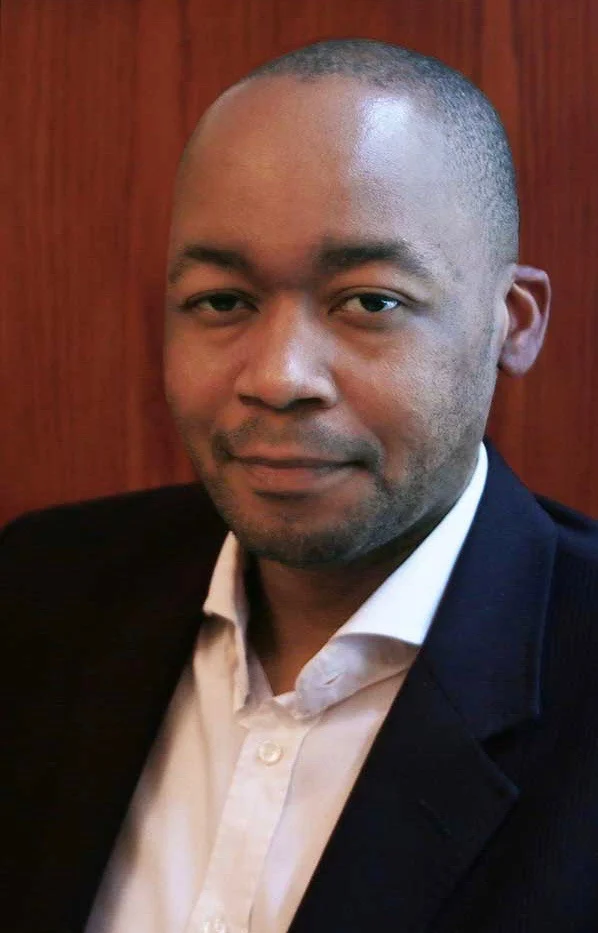Bongani Ndodana-Breen
South Africa
Isiko: An African Ritual for ancestral intercession was composed in 2019 and was premiered at the Baruch Performing Arts Center in New York City on October 1st 2020. It is connected to Beethoven’s Sonata no. 29 in B-flat Major Op. 106, “Hammerklavier”.
The piece is dedicated to Uyinene Mrwetyana and other victims of femicide in South Africa.
About femicide and the death of Uyinene Mrwetyana
Bongani Ndodana-Breen is a South African composer, musician and cultural activist. He was born in 1975 in Queenstown, South Africa and is a member of the Xhosa clan. He was educated at St. Andrew's College and Rhodes University in Grahamstown where he graduated with a PhD in Music Composition. In 1998 Ndodana-Breen was the first Black classical composer to be awarded the prestigious Standard Bank Young Artist Award for Music, by the National Arts Festival and sponsored by Standard Bank of South Africa. He was profiled on CNN African Voices for his work Harmonia Ubuntu commissioned for the centenary of Nelson Mandela and based on his writings and speeches. He is a fellow at the Radcliffe Institute at Harvard University for the 2019/2020 academic year.
Dr. Ndodana-Breen's music is a blend of African and classical styles. Some of his music reflects on various scenes from his native Xhosa culture.
He has received commissions from across the globe from the Hong Kong Chinese Orchestra, the Miller Theatre of New York, Vancouver Recital Society, Minnesota Orchestra, Indianapolis Chamber Orchestra, and Wigmore Hall, London (a quintet for pianist Maria João Pires.
He has written operas, orchestral and chamber works, including the opera Winnie The Opera based on anti-apartheid activist Winnie Mandela. South Africa's liberation struggle seems to be a major theme in his orchestral works such as his piano concerto Emhlabeni, the short opera Hani on the anti-apartheid activist Chris Hani and more recently the oratorio Credo, a musical testament to the Freedom Charter.
Dr. Ndodana-Breen is also an advocate for cultural diversity, supporting various African efforts including LGBT causes.
Composer’s Note
“Isiko” is a Nguni word for a sacred ritual or rite that binds us, the living, with the ancestral realm. Through this ancient rite, a family or clan or community convenes to ask the ancestors to intercede during a great tragedy or crisis, when matters are beyond the collective wisdom of the community and its elders.
Horrific levels of femicide confront the people of South Africa. According to official police statistics (2019), a woman is murdered every three hours in the country. To compound this horror, South Africa has one of the highest rates of sexual assault in the world. According to the most recent data from the World Health Organization, it ranks fourth out of a hundred and eighty-three countries when it comes to femicide, or the killing of a woman or girl on account of her gender. Uyinene Mrwetyana, the 19 year old university student to whose memory this piano work is dedicated, was one such tragic statistic.
Isiko opens with a brooding, mysterious theme in the lower register of the piano. This is meant to sound as if improvised, sung by a diviner (or traditional healer) reaching out into the mysterious world known only to our ancestors. The musical material draws from the hexatonic (six note scale) modal melodies common in umngqokolo, a style of singing practiced by Xhosa women. A brief descending flourish signals the end of the introduction and now the music invokes a call and response sequence that occurs 4 times. This is modelled on traditional divination rituals where the diviner, after being in communion with the ancestors, shouts “Vumani!”(Do you agree!) and those present respond “Siyavuma! (we agree!). At the end of this divination sequence the Dona nobis pacem theme of Beethoven’s Missa Solemnis emerges in the bass followed by echoes of the opening bars of Sonata No. 29 (Hammerklavier). The Dona nobis pacem theme is repeated softly and tremolando in the upper register of the instrument, alluding to the ethereal. It returns again in declamatory octaves at the outer ranges of the piano superimposed over the theme from the introduction which is now in the middle (alto) register in contrast to its first appearance in the bass.
Other African references include umxhentso a traditional dance of the Xhosa performed mostly by Amagqirha (traditional healers), allusions to the interlocking patterns of amadindaI log xylophones of Uganda, and a hint of the kora (West Africa lute-harp).
Isiko was commissioned by Yael Weiss as part of the 32 Bright Clouds project, with support from The Adele and John Gray Endowment Fund. It is dedicated to Uyinene Mrwetyana and other victims of femicide in South Africa.


